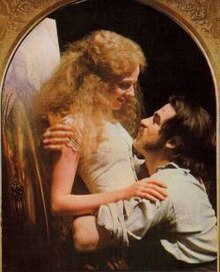The Love School: Difference between revisions
Paul Barlow (talk | contribs) No edit summary |
Paul Barlow (talk | contribs) No edit summary |
||
| Line 1: | Line 1: | ||
'''The Love School''' was a 1975 [[BBC]] television drama series about the [[Pre-Raphaelite Brotherhood]], written by [[John Hale]], [[Ray Lawler]], [[Robin Chapman]] and [[John Prebble]]. It was directed by [[Piers Haggard]], [[John Glenister]] and [[Robert Knights]]. It was shown during January and February 1975.<ref>[http://ftvdb.bfi.org.uk/sift/series/25876 BFI database]</ref> The series was shown in the USA under the title ''The Brotherhood''. Each episode was 75 minutes in length. |
[[File:Love schoolannie.jpg|thumb|Holman Hunt caresses Annie Miller while painting [[The Light of the World]]]]'''The Love School''' was a 1975 [[BBC]] television drama series about the [[Pre-Raphaelite Brotherhood]], written by [[John Hale]], [[Ray Lawler]], [[Robin Chapman]] and [[John Prebble]]. It was directed by [[Piers Haggard]], [[John Glenister]] and [[Robert Knights]]. It was shown during January and February 1975.<ref>[http://ftvdb.bfi.org.uk/sift/series/25876 BFI database]</ref> The series was shown in the USA under the title ''The Brotherhood''. Each episode was 75 minutes in length. |
||
The drama was a significant influence on the subsequent series ''[[Desperate Romantics]]'' (2009). It was also the basis of the historical novel of the same name by Hale.<ref>John Hale, ''The Love School'', Macmillan, 1975.</ref> |
The drama was a significant influence on the subsequent series ''[[Desperate Romantics]]'' (2009). It was also the basis of the historical novel of the same name by Hale.<ref>John Hale, ''The Love School'', Macmillan, 1975.</ref> |
||
Revision as of 14:53, 3 September 2009

The Love School was a 1975 BBC television drama series about the Pre-Raphaelite Brotherhood, written by John Hale, Ray Lawler, Robin Chapman and John Prebble. It was directed by Piers Haggard, John Glenister and Robert Knights. It was shown during January and February 1975.[1] The series was shown in the USA under the title The Brotherhood. Each episode was 75 minutes in length.
The drama was a significant influence on the subsequent series Desperate Romantics (2009). It was also the basis of the historical novel of the same name by Hale.[2]
Cast
- Peter Egan as John Everett Millais
- Ben Kingsley as Dante Gabriel Rossetti
- Bernard Lloyd as William Holman Hunt
- Gareth Hunt as Thomas Woolner
- Patricia Quinn as Elizabeth Siddal
- David Collings as John Ruskin
- Anne Kidd as Effie Gray
- Sheila White as Annie Miller
- Kenneth Colley as Edward Burne-Jones
- David Burke as William Morris
- Kika Markham as Jane Morris
Episodes
1. The Brotherhood
(22 January, screen writer: John Hale, director: Robert Knights)
In 1848, social unrest abounds. The Pre-Raphaelite Brotherhood, a secret group of young artists, forms in order to take on the sclerotic Royal Academy. The original three members are joined by four friends.
2. An Impeccable Elopement
(January 29, screenwriter: John Hale, director: Piers Haggard)
Art critic John Ruskin and his wife Effie travel to Scotland with John Everett Millais, one of leaders of the PRB. Millais falls in love with Effie and learns that the Ruskins' marriage is a sham.
3. Seeking the Bubbles
(February 5, screenwriter: Ray Lawler, director: Piers Haggard)
Millais has married Effie. Hunt and Millais both become successful artists
4. Remember Me
(February 12, screen writer: Robin Chapman, director: John Glenister)
Rossetti's life and relationships become complicated, especially after the tragic death of his wife Lizzie.
5. Beata Beatrix
(February 19, screenwriter: Robin Chapman, director: Piers Haggard)
Rossetti acquires a follower in William Morris but his life is troubled by drug addiction, and he becomes increasingly isolated.
6. The Artisan
(February 26, screenwriter: John Prebble, director: Piers Haggard)
Pre-Raphaelitism begins to disintegrate when William Morris adopts a new ideal in socialism.
Notes
- ^ BFI database
- ^ John Hale, The Love School, Macmillan, 1975.
